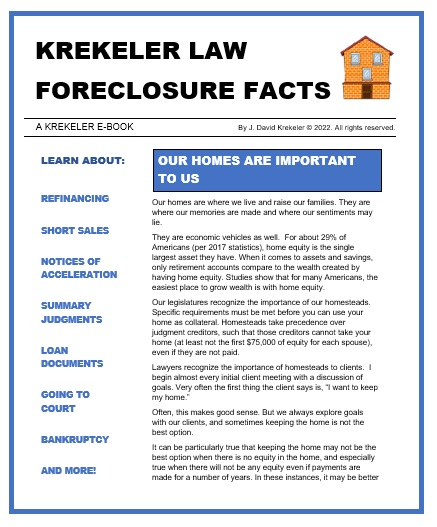This is a question we often get from clients. We explain to them that bankruptcy is an intensive information gathering exercise and that it is really all about disclosure on their parts. Bankruptcy provides a fresh start, but to get that fresh start the debtor must provide a full and complete disclosure. The debtor must also surrender any non-exempt assets for liquidation, with the proceeds to be distributed to creditors.
Naturally, debtors do not want to lose assets that they have worked hard for.
Among the most prized assets is someone’s home. The homestead exemption in Wisconsin is $75,000 in equity for each debtor (or $150,000 for a married couple).
To determine the equity in a home, its value must be determined, and then the amounts owed on the mortgage (or some other liens) must be subtracted. Therefore, in bankruptcy, debtors benefit from having a low valuation of the home.
A client filing bankruptcy should not, however, declare the value of their home to be lower than it really is. In fact, we do not want any artificial valuation. The best value, and the one that we want, is the honest and best estimate that can be provided.
A lawyer’s advice is only as good as the information it is based upon. If we base our advice upon an artificial and wrong estimate, that advice may not serve our clients well.
An artificially low evaluation could also cause significant legal problems. I once represented a couple who insisted to me that their home was worth $135,000. I urged them to have a real estate broker provide us with a market analysis or broker price opinion, but they adamantly refused. We filed their case, and then the bankruptcy trustee had his own broker look at the home. That broker told the trustee that he could easily sell the home for $175,000, and the trustee did so. The equity in the home exceeded the exempt amount of $150,000, and the trustee took that non-exempt portion of $25,000 and distributed it to creditors. Had my clients properly valued the home, we could have engaged in some pre-filing planning and protected their equity.
I do not think that my clients in that case intentionally undervalued their home. Had they done so, the trustee could have sought to have their discharge denied. Making fraudulent representations to the Court can be grounds for denial of a bankruptcy discharge. If that had happened, my clients would not only have lost some of the equity in their home, but they would still owe all their debts.
In summary, when it comes to valuing a client’s home during a bankruptcy, I want the most accurate and honest valuation possible. I would not permit a client to use a valuation that I knew to be incorrect. Integrity is the most important asset in my profession. Imagine how that asset would be impacted if a client of mine were ever to appear at a hearing and answered under oath that I had instructed or even allowed them to use a value I knew to be false.
The best approach is to value things honestly and allow your lawyer to do his/her job in protect you or your assets. We are experienced and good at that function.


